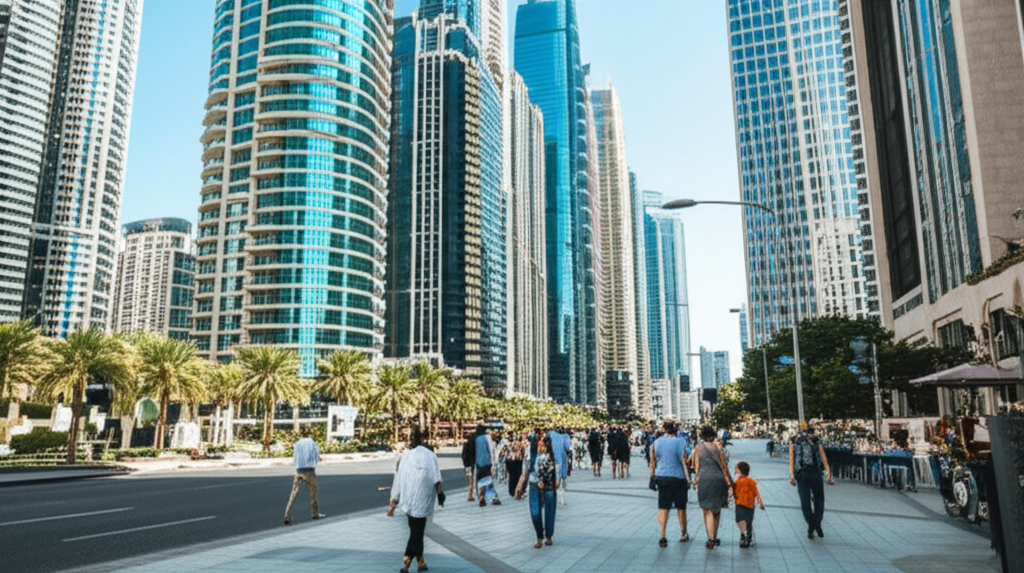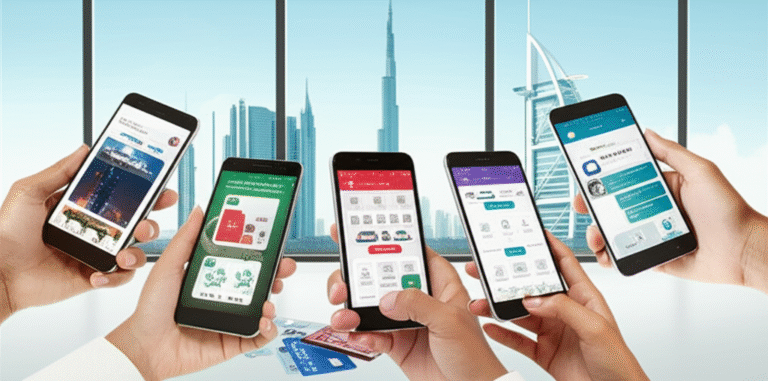Yes, Americans can absolutely live in Dubai! It’s a popular destination for expats seeking a high quality of life, excellent career opportunities, and a vibrant culture. Dubai offers a welcoming environment for Americans, with a straightforward process for obtaining residency and settling in. This guide will walk you through everything you need to know to make your move smooth and successful.
Can Americans Live in Dubai: Your Essential Guide to Making the Move
Thinking about packing your bags and starting a new chapter in Dubai? You’re not alone! Many Americans are drawn to Dubai for its incredible opportunities, safe environment, and unique lifestyle. But if you’re wondering about the practicalities, like visas, finding a home, and getting connected, you’ve come to the right place. It can feel a bit overwhelming at first, but with a clear, step-by-step approach, settling into Dubai will be much simpler than you imagine. Let’s break down exactly what you need to know to make your dream of living in Dubai a reality.
Contents
Understanding Dubai’s Appeal for Americans
Dubai has become a global hub, attracting talent and investment from all over the world, and Americans are a significant part of this diverse community. The city boasts a booming economy, particularly in sectors like finance, real estate, tourism, and technology, offering plenty of career prospects. Beyond the professional advantages, Dubai provides a remarkably high standard of living. It’s known for its safety, cleanliness, world-class infrastructure, and a vast array of entertainment and leisure activities. For many Americans, the appeal lies in experiencing a different culture while enjoying modern amenities and a dynamic, forward-thinking atmosphere.
The expatriate community in Dubai is extensive, meaning you’ll find a familiar sense of community and support. English is widely spoken, making daily life and communication much easier. Furthermore, the UAE government actively encourages foreign investment and residency, creating a business-friendly environment that benefits expats.
The Visa Process: Your Gateway to Living in Dubai
To live in Dubai, Americans will need a residency visa. The most common pathway is through employment. If you secure a job offer from a Dubai-based company, your employer will typically sponsor your residency visa. This process involves several steps, but your employer will guide you through most of it.
Employment Visa (Work Permit)

This is the most straightforward route for many. Here’s a general overview:
- Job Offer: You must first receive a job offer from a UAE-based company.
- Entry Permit: Once the offer is accepted, the company applies for an entry permit for you. This allows you to enter the UAE to complete the residency process.
- Medical Fitness Test: Upon arrival in the UAE, you’ll undergo a mandatory medical examination. This typically includes blood tests to screen for communicable diseases.
- Residency Visa Stamping: After passing the medical test, your passport will be stamped with the residency visa, usually valid for two or three years, depending on the employment contract.
- Emirates ID: You’ll also need to apply for an Emirates ID, which is a mandatory identification card for all residents.
It’s important to note that the specific requirements and processing times can vary. Your sponsoring employer will be your primary resource for detailed information and assistance throughout this process.
Other Visa Options
While employment is the most common, Dubai also offers other visa types that might be relevant:
- Investor Visa: For those looking to invest in Dubai’s economy.
- Retirement Visa: Available for individuals meeting specific financial requirements who wish to retire in Dubai.
- Freelancer Visa: For self-employed individuals working in specific creative and digital fields.
- Golden Visa: A long-term residency visa for investors, entrepreneurs, specialized talents, and researchers.
Each of these has its own set of criteria and application procedures, which can be found on the official website of the Federal Authority for Identity, Citizenship, Customs & Port Security (ICP).
Finding Accommodation in Dubai
Once your visa is sorted, finding a place to live is the next big step. Dubai offers a wide range of housing options, from luxurious apartments and villas to more affordable studios. The rental market is quite active, and it’s advisable to start your search before you arrive or as soon as you get your entry permit.
Popular Residential Areas
Your choice of neighborhood will depend on your budget, lifestyle, and proximity to work. Here are a few popular areas:
- Downtown Dubai: Known for its iconic landmarks like the Burj Khalifa and Dubai Mall, offering high-end apartments and a vibrant city life.
- Dubai Marina: Famous for its stunning waterfront apartments, restaurants, and entertainment options.
- Jumeirah Beach Residence (JBR): Offers a lively beachside living experience with many amenities.
- Business Bay: A commercial and residential district with modern skyscrapers and convenient access to downtown.
- Deira and Bur Dubai: Older, more traditional areas offering a wider range of prices and a glimpse into Dubai’s past.
- The Springs, The Meadows, and Emirates Hills: Popular for villa communities, offering a more suburban feel.
Renting an Apartment or Villa
The rental process is generally straightforward:
- Search: Use online property portals like Property Finder, Bayut, or Dubizzle. You can also work with real estate agents.
- Viewings: Schedule viewings of properties that interest you.
- Offer and Contract: Once you find a place, you’ll make an offer. If accepted, you’ll sign a tenancy contract (Ejari) with the landlord or real estate agent. The Ejari registration is mandatory and protects both parties.
- Deposit and Rent: Typically, you’ll pay a security deposit (usually 5% of the annual rent) and rent in advance, often through post-dated cheques for the year.
Rental prices can vary significantly based on location, size, amenities, and whether the property is furnished or unfurnished. It’s essential to understand the terms of your tenancy contract before signing.
Setting Up Your Telecom Services
Staying connected is crucial, and Dubai has excellent mobile and internet services. The two main providers are Etisalat and DU. As Neritan Kodra, I’m here to make this super simple for you!
Choosing a Mobile Provider
Both Etisalat and DU offer a range of prepaid and postpaid plans. For newcomers, a prepaid SIM card is often the easiest way to start.
Etisalat
Etisalat is known for its extensive network coverage and competitive pricing. You can easily get a prepaid SIM card from:
- Etisalat stores across the city.
- Dubai International Airport.
- Authorized retailers.
You’ll need your passport and visa copy to register. To check your balance, you can dial 100# or use the Etisalat UAE mobile app.
DU
DU is the other major provider, offering similar services and network quality. You can get a DU SIM card from:
- DU stores.
- Dubai International Airport.
- Partner outlets.
The registration process is the same: passport and visa copy are required. To check your balance, dial 135# or download the DU mobile app.
Internet Services at Home
For home internet, you’ll typically need to sign up for a package that includes Wi-Fi. Both Etisalat and DU offer broadband services. You’ll need your tenancy contract and Emirates ID to set up an account.
The installation process usually involves a technician visiting your home to set up the router. Monthly bills are often paid via direct debit or through their respective apps.
Understanding Telecom Costs
Here’s a quick look at typical costs to help you budget:
| Service | Provider | Estimated Monthly Cost (AED) | Notes |
|---|---|---|---|
| Prepaid SIM Card (Data + Calls) | Etisalat / DU | 50 – 150 | Depends on data allowance and call minutes. |
| Postpaid SIM Card (Data + Calls) | Etisalat / DU | 100 – 300+ | Higher data limits, often with bundled international calls. |
| Home Internet (Basic Package) | Etisalat / DU | 250 – 400 | Includes Wi-Fi router, speeds vary. |
| Home Internet (Premium Package) | Etisalat / DU | 400 – 600+ | Higher speeds, often bundled with TV channels. |
Note: 1 USD is approximately 3.67 AED.
Dubai is designed for convenience, and getting around and managing daily tasks is generally easy for Americans.
Transportation
Dubai has an efficient public transportation system:
- Dubai Metro: A modern, clean, and reliable way to travel between major areas. You’ll need a Nol card, which can be purchased and topped up at any metro station.
- Buses: An extensive bus network covers most of the city. Again, a Nol card is required.
- Taxis: Readily available and metered. Ride-sharing apps like Uber and Careem are also very popular.
- Driving: If you plan to drive, you’ll need to obtain a UAE driving license. This usually involves converting your US license if it’s from certain states, or undergoing driving tests.
Healthcare
Dubai has a high-quality healthcare system with many international-standard hospitals and clinics. As a resident, you’ll need health insurance, which is typically provided by your employer. If you’re self-employed or your employer doesn’t provide it, you’ll need to purchase a policy.
You can find comprehensive information on healthcare services and insurance requirements on the Dubai Health Authority (DHA) website.
Banking
Opening a bank account in Dubai is a standard procedure. You’ll typically need:
- Passport with valid residency visa stamp.
- Emirates ID.
- Proof of employment or income (e.g., salary certificate, employment contract).
- Reference letter from your current bank (sometimes required).
Major international banks operate in Dubai, as well as strong local institutions like Emirates NBD and Mashreq Bank.
Culture and Lifestyle
Dubai is a melting pot of cultures. While it’s an Islamic country, it’s also very tolerant and accommodating of other nationalities and their customs. Dress modestly in public places, especially when visiting religious sites. During the holy month of Ramadan, it’s important to be mindful of local customs regarding eating, drinking, and public displays of affection during fasting hours.
The city offers endless entertainment, from world-class shopping malls and fine dining to desert safaris and beach clubs. There’s a strong emphasis on family activities and outdoor living.
Frequently Asked Questions (FAQs)
Do Americans need a visa to live in Dubai?
Yes, Americans need a residency visa to live in Dubai. The most common way to obtain this is through employment sponsorship by a Dubai-based company.
How long does it take to get a residency visa?
The process typically takes a few weeks from the time you arrive in Dubai with an entry permit, assuming all your documents are in order and you pass the required medical tests.
Can I open a bank account without a residency visa?
Generally, a residency visa and Emirates ID are required to open a full-service bank account. Some banks might offer limited accounts for tourists, but these are not suitable for long-term residency.
Is it expensive to live in Dubai?
Dubai can be expensive, but it also offers options for various budgets. Accommodation and dining can range from affordable to luxurious. Your overall cost of living will depend heavily on your lifestyle choices and spending habits.
What is the main currency in Dubai?
The currency is the United Arab Emirates Dirham (AED). The exchange rate is fixed at approximately 3.67 AED to 1 US Dollar.
Is it safe for Americans to live in Dubai?
Yes, Dubai is considered one of the safest cities in the world, with very low crime rates. It’s a welcoming environment for expatriates from all backgrounds.
Conclusion
Living in Dubai as an American is a well-trodden path, offering a unique blend of career growth, modern living, and cultural immersion. By understanding the visa requirements, planning your accommodation, and familiarizing yourself with daily life essentials like setting up telecom services, you can transition smoothly into your new life in this dynamic city. The infrastructure, services, and welcoming atmosphere make Dubai an attractive destination for those seeking new opportunities and a high quality of life. Embrace the adventure, and you’ll find Dubai to be an incredibly rewarding place to call home.


